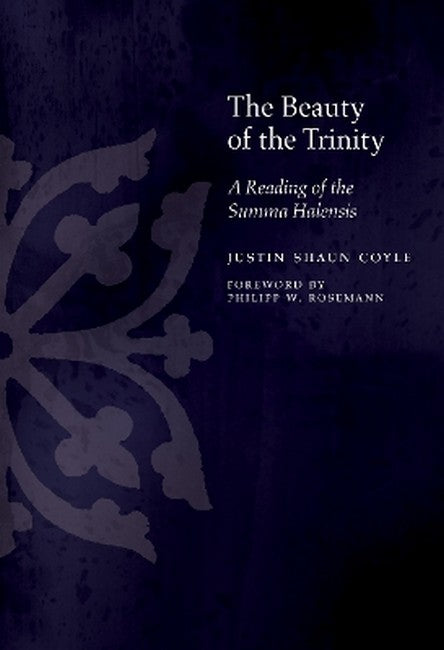Justin Coyle (Author) Justin Shaun Coyle (PhD, Boston College) is Associate Professor of Theology, Church History, and Philosophy and Associate Academic Dean at Mount Angel Seminary in St. Benedict, Oregon. He is a tonsured reader in the Ukrainian Greek Catholic Church.
Request Academic Copy
Please copy the ISBN for submitting review copy form
Description
Foreword by Philipp W. Rosemann / vii List of Abbreviations / xi Introduction / 1 Part I: Beauty among the Transcendentals 1 Transcendentals and Trinity / 9 Transcendentals in the Summa Halensis * A Trinitarian Motive 2 Transcendentals as Trinitarian Appropriation / 22 A Grammar of Trinitarian Appropriation * One, True, and Good as Trinitarian Appropriations 3 Beauty as Transcendental Order / 35 Is Beauty a Transcendental? An Aesthetic Aporia * An Anonymous Proposal * Beauty as Sacred Order of the Trinity * Beauty as Order of the Transcendentals Part II: The Trinity's Beauty ad intra 4 The Beauty the Trinity Is / 57 Persons and Processions * The Order of the Trinity * Is Not the Son Beauty, Too? Part III: The Trinity's Beauty ad extra 5 The Beauty Creation Is / 77 Creation and Trinitarian Processions * Trinitarian Causality * Trinitarian Traces * The Beauty of Creation 6 The Beauty the Soul Is / 96 The Soul and Its Powers: A Disputed Question * The Soul and Its Powers in the Early Halensian School * Brother Alexander on the Imago trinitatis 7 The Beauty Grace Gives / 112 Sin as Antitrinity * Grace's Trinitarian Condition * The Trinitarian Structure of Grace * Grace as Trinitarian Enjoyment Conclusion & ad obiectiones / 131 Acknowledgments / 141 Notes / 143 Bibliography / 201 Index / 221
A generous but decisive corrective to many previous accounts on the transcendentality of beauty during the later Middle Ages.---Mark D. Jordan, Harvard Divinity School Scholars have come to be used to the notion that academic writing has to be on the dull side, as though a flat style guaranteed the objectivity of scholarly discourse. But what if the point of theological writing were not merely to state the "facts" about the teachings of some (frequently obscure) author, but to employ a discussion of these teachings to draw the reader in--in to the beauty of the Christian faith? This goal would call for a different style. Its dynamism would signal thinking rather than settled thought. Its choice of words would steer clear of the well-worn phrases and cliches which stifle curiosity; sometimes the vocabulary might even surprise. It would be pleasantly fresh, an invitation to participate in an intellectual and spiritual journey. Such is Dr. Coyle's style in this book. ---Philipp W. Rosemann, from the Foreword This is an exemplary study. It is also an exquisite specimen of theological reflection. It does so very much to rescue Alexander of Hales's thought on beauty both from obscurity and from unimaginative scholarly treatments. And it convincingly shows how Alexander's vision can be appropriated creatively by modern theologians.---David Hart, author of Roland in Moonlight and You Are Gods

